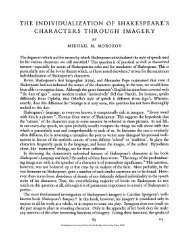changing places in 'othello' - Fairfield High School English Department
changing places in 'othello' - Fairfield High School English Department
changing places in 'othello' - Fairfield High School English Department
Create successful ePaper yourself
Turn your PDF publications into a flip-book with our unique Google optimized e-Paper software.
mithi, Iago's equivalent, the Ensign, is motivated not<br />
by thwarted ambition, but by lust; it is not his rival's<br />
rank that the Ensign covets, but his favour with<br />
Disdemona. It is worth ask<strong>in</strong>g why Shakespeare,<br />
who seems to have worked with a version of Giraldi<br />
beside him and who otherwise seldom departs from<br />
his orig<strong>in</strong>al without good reason, should have<br />
chosen to make * place' the po<strong>in</strong>t at issue <strong>in</strong> this<br />
way.5 Kenneth Muir's explanation (fairly representative<br />
of those critics who have troubled to pose the<br />
question) is that it is merely a device to complicate<br />
the villa<strong>in</strong>'s motives. The loss of promotion is one<br />
of three st<strong>in</strong>gs of envy which have lodged <strong>in</strong> Iago: it<br />
comb<strong>in</strong>es with * pathological jealousy of his wife'<br />
and 'a jealous love of Desdemona' to arouse his<br />
hatred of the Moor; but <strong>in</strong> Muir's estimate it is the<br />
least important of the three because it' is not directly<br />
mentioned after the start of the play, except once'.6<br />
I should argue that the sheer dramatic prom<strong>in</strong>ence<br />
given to the lost lieutenancy by the open<strong>in</strong>g dialogue<br />
establishes it as so much an essential donnee of the<br />
action that it scarcely needs reiteration — particularly<br />
s<strong>in</strong>ce Iago's nagg<strong>in</strong>g consciousness of the slight is<br />
registered <strong>in</strong> a self-lacerat<strong>in</strong>g punctilio over Cassio's<br />
title of rank. He uses the word * lieutenant' more<br />
often than all the other characters of the play<br />
together: fifteen of its twenty-five occurrences are<br />
from his mouth, where it <strong>in</strong>creas<strong>in</strong>gly sounds like a<br />
k<strong>in</strong>d of sarcastic caress. Just as tell<strong>in</strong>gly it is Othello's<br />
'Now art thou my Lieutenant' (3.3.475) - perhaps<br />
the weightiest half-l<strong>in</strong>e <strong>in</strong> the tragedy — which<br />
announces Iago's moment of supreme triumph. Far<br />
from be<strong>in</strong>g a mere aggravation of the villa<strong>in</strong>'s<br />
envious disposition, the question of place lies at the<br />
very heart of the play: properly understood it is the<br />
only begetter of that' monstrous birth' which issues<br />
from the fertile womb of Iago's resentment.<br />
At the same time as he made the question of<br />
promotion the focus of Iago's bitterness, Shakespeare<br />
also elected to change his rival's rank. In Giraldi,<br />
Cassio's counterpart is called 'the Capta<strong>in</strong>'. The<br />
alteration may, at first sight, seem trivial, but its<br />
<strong>in</strong>herent improbability makes it virtually certa<strong>in</strong> that<br />
it was done with deliberate purpose: for .while<br />
capta<strong>in</strong> was a long-established military rank, lieutenant<br />
was still someth<strong>in</strong>g of a novelty; <strong>in</strong> Shake-<br />
SHAKESPEARE SURVEY<br />
120<br />
Shakespeare Survey Onl<strong>in</strong>e © Cambridge University Press, 2007<br />
speare's own plays where ' capta<strong>in</strong>' is commonplace,<br />
'lieutenant' is relatively rare, occurr<strong>in</strong>g only n<strong>in</strong>e<br />
times <strong>in</strong> the rest of the canon. In six of these cases it<br />
appears to denote a specific grade of officer, more or<br />
less equivalent to the modern rank, <strong>in</strong> the others it<br />
carries its older, more general sense of' deputy' or<br />
' substitute'; only <strong>in</strong> Othello does it seem to describe<br />
a rank immediately below that of general, correspond<strong>in</strong>g<br />
to the modern lieutenant-general. Clearly,<br />
then, the word had not yet stabilized to its modern<br />
mean<strong>in</strong>g and still carried a good deal of its orig<strong>in</strong>al<br />
French sense, 'one hold<strong>in</strong>g [another's] place' (lieu<br />
tenant); and <strong>in</strong> a play so ferociously preoccupied with<br />
place it <strong>in</strong>evitably develops the force of a peculiarly<br />
bitter pun.7 For Iago <strong>in</strong> particular it acts as a constant<br />
rem<strong>in</strong>der that Cassio is not merely the man appo<strong>in</strong>ted<br />
to deputize <strong>in</strong> the general's place, but the one who<br />
is stand<strong>in</strong>g <strong>in</strong> his own. While Cassio is <strong>in</strong> the<br />
ascendant, Iago probes the word as one might an<br />
ach<strong>in</strong>g tooth, goad<strong>in</strong>g the pa<strong>in</strong> of his own deprivation;<br />
and then, as his rival's star beg<strong>in</strong>s to wane,<br />
' lieutenant' becomes a term of contempt, a covert<br />
sarcasm anticipat<strong>in</strong>g their change of <strong>places</strong>. Thus the<br />
high po<strong>in</strong>t of Iago's v<strong>in</strong>dictive pleasure <strong>in</strong> the<br />
dr<strong>in</strong>k<strong>in</strong>g scene is reached with Cassio's stumbl<strong>in</strong>g<br />
recognition that he is behav<strong>in</strong>g <strong>in</strong> a fashion 'unworthy<br />
of his place' (2.3.96), and registered <strong>in</strong> Iago's<br />
softly crow<strong>in</strong>g response,' It's true, good Lieutenant'<br />
(1. 100). His triumph is confirmed by Montano's<br />
sober expression of disappo<strong>in</strong>tment.<br />
'tis great pity that the noble Moor<br />
Should hazard such a place as his own second<br />
With one of an <strong>in</strong>graft <strong>in</strong>firmity. (2.3.133—5)<br />
5 See M. R. Ridley (ed.), Othello, the Arden Shakespeare,<br />
paperback edn. (1965), Appendix 1, p. 238.<br />
6 See the <strong>in</strong>troduction to his New Pengu<strong>in</strong> edition, pp. 20,<br />
15-<br />
7 It is just possible that the pun was emphasized by<br />
Shakespeare's preferred pronunciation of the word, s<strong>in</strong>ce<br />
the alternative spell<strong>in</strong>g 'lieftenant', which is thought to<br />
represent the usual seventeenth-century pronunciation,<br />
occurs only once <strong>in</strong> the canon (<strong>in</strong> the Quarto text of 2<br />
Henry IV, 5.5.95). That Shakespeare was th<strong>in</strong>k<strong>in</strong>g of his<br />
titles of rank <strong>in</strong> this way is given some <strong>in</strong>dependent<br />
confirmation by the apparent play on Iago's rank (ancient/<br />
ensign) at 1.1.157-8: ' I must show out a flag and sign of<br />
love, / Which is <strong>in</strong>deed but sign'.



